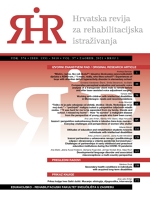“Teško mi je palo odvajanje od obitelji, društva i škole. Nedostajao mi je moj dom.” – “preživjeti” malignu bolest iz perspektive izliječenih mladih osoba
''It was hard for me to be separated from my family, friends and school. I missed my home'': how ''to survive'' a malignant disease from the perspective of young people who have been cured
Author(s): Anita DžombićSubject(s): Education, Psychology, Health and medicine and law, Family and social welfare
Published by: Sveučilište u Zagrebu, Edukacijsko-rehabilitacijski fakultet
Keywords: malignant diseases; young people; psychosocial consequences; survival;
Summary/Abstract: The aim of this study was to gain a better understanding of the experience of surviving a malignant disease from the perspective of young people who have been cured. The study involved 20 young patients who had previously undergone treatment for a malignant disease (acute lymphoblastic leukaemia, medulloblastoma, osteosarcoma, Ewing’s sarcoma, Non-Hodgkin’s lymphoma, and aplastic anaemia). Data was collected using a questionnaire and results were analysed using the thematic analysis method. The three main themes of the study are: 1) realization of being seriously ill, 2) the demanding aspects of treatment, and 3) perceived negative and positive outcomes of the illness. The results describe the reactions of the children when they found out about the diagnosis and their understanding of the nature of the disease. The results indicate that the young people did not respond well to social isolation, separation from members of their social network, certain medical procedures, and the lack of understanding shown by their social circle. The disease had an impact on their physical appearance, self-confidence, and carefree childhood, as well as reduced their possibility of further education, choice of activities in free time, and weakened social contacts. In spite of the damaging consequences of the illness, these young people observed many positive impacts, including increased maturity, personal strength, and engagement in civil society organisations dealing with peer-to-peer support. These empirical findings suggest the need for comprehensive psychosocial support programmes for young people suffering from malignant diseases, both during and after active medical treatment. These programmes should focus on improving information technology, physical and mental health, educational achievements and peer education.
Journal: Hrvatska revija za rehabilitacijska istrazivanja
- Issue Year: 57/2021
- Issue No: 1
- Page Range: 66-84
- Page Count: 19
- Language: English, Croatian

